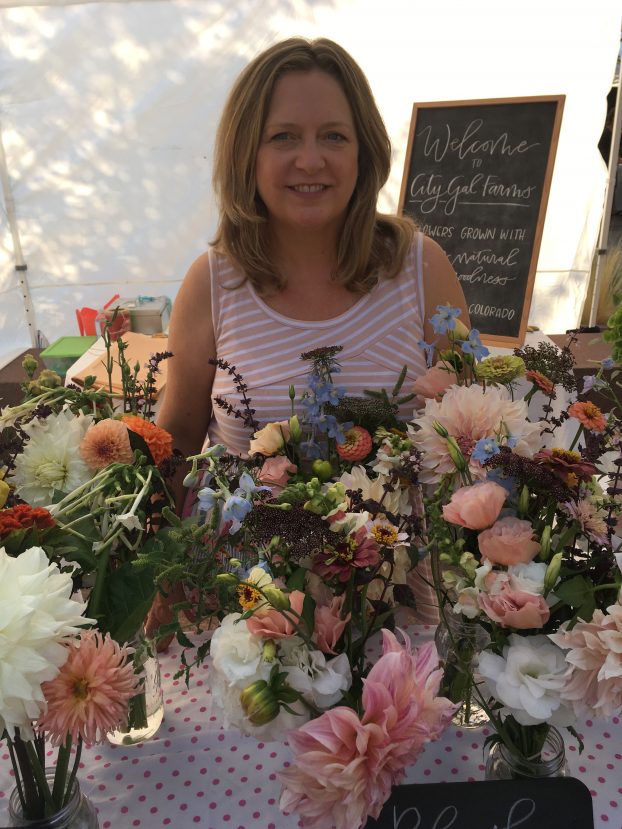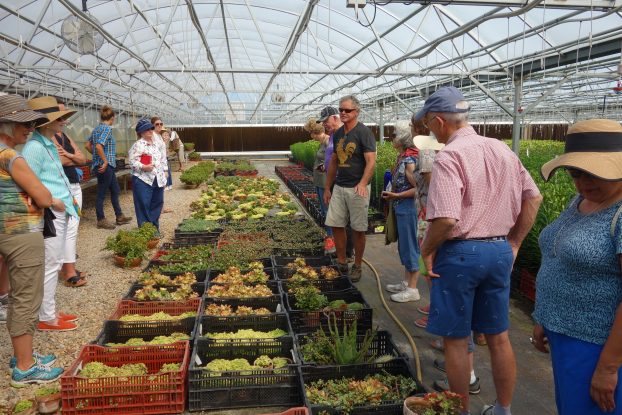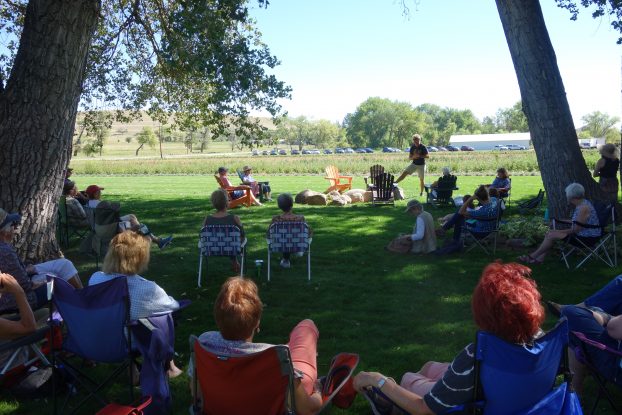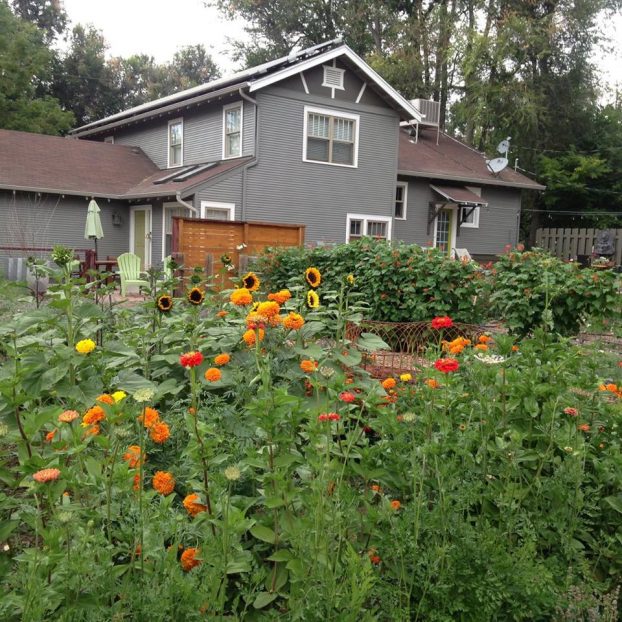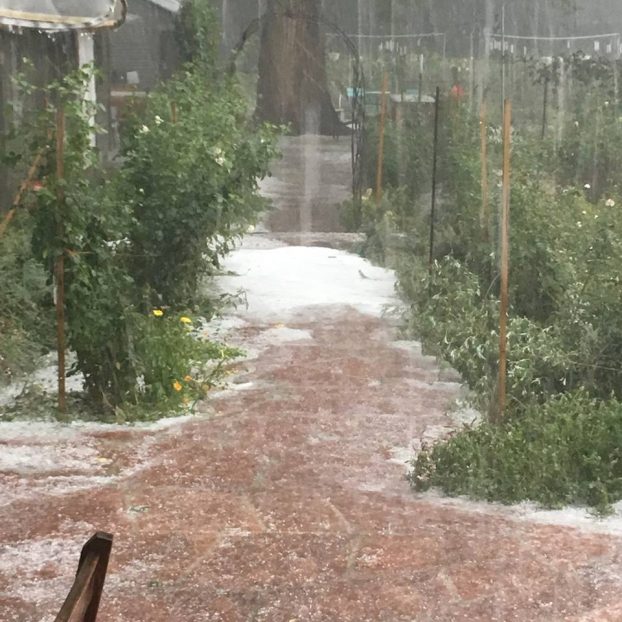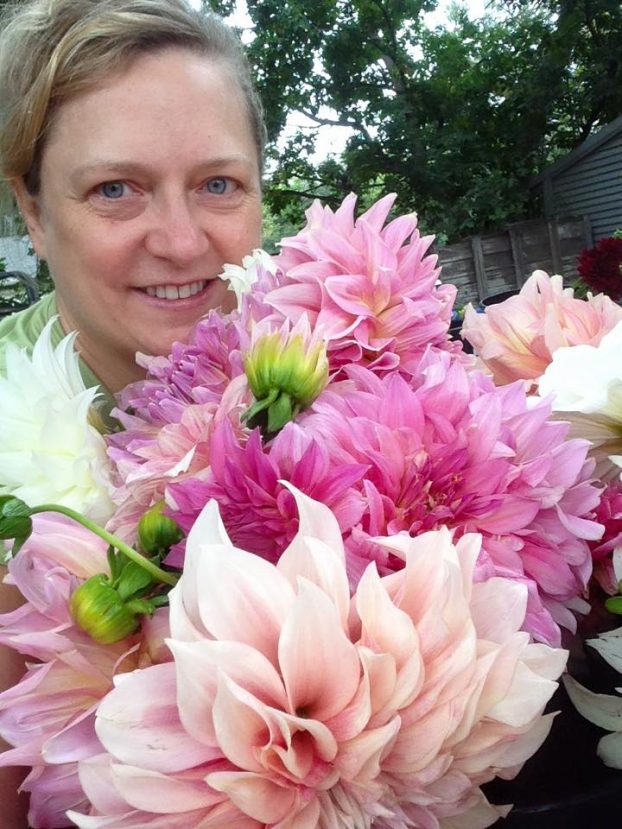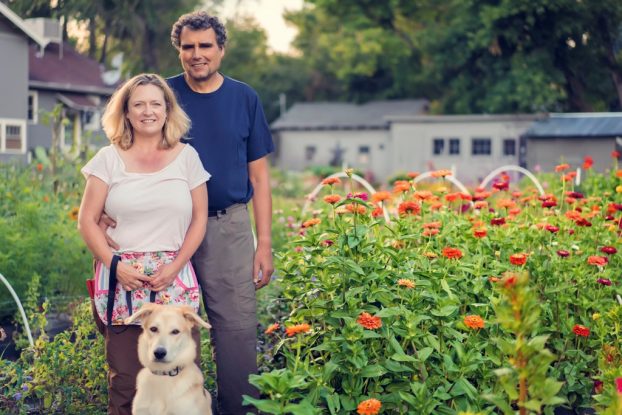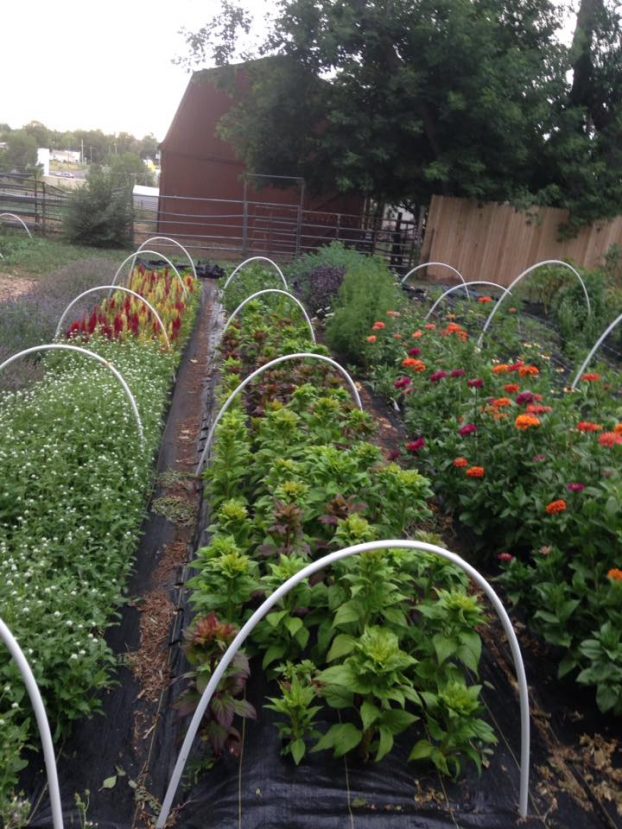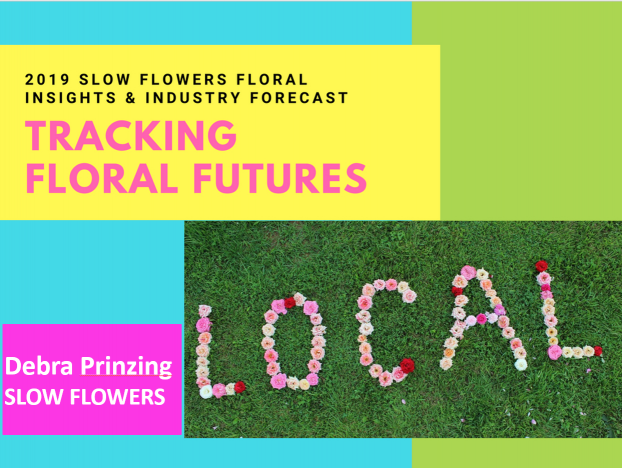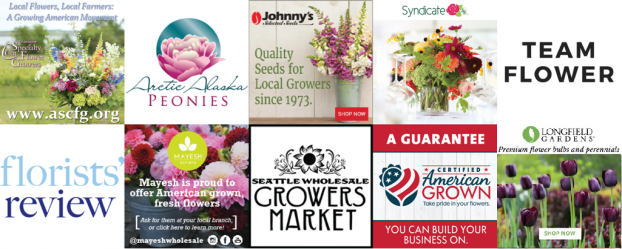Episode 368: Urban Flower Farming in Denver with Kim Burton of CityGal Farms
September 26th, 2018
Podcast: Play in new window | Download
Subscribe: Apple Podcasts | Podcast Index | RSS | More
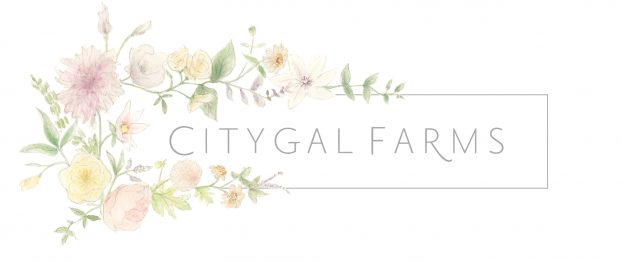 A few weeks ago, I spent three wonderful days in Denver, where I reconnected with my Slow Flowers friends and met many new ones.
A few weeks ago, I spent three wonderful days in Denver, where I reconnected with my Slow Flowers friends and met many new ones.
I was there as a guest of the Denver Botanic Gardens, returning for a second time as a featured presenter in the 2018 Bonfils-Stanton Lecture Series, “The Edge of Art and Gardens.”
 Hats off to the educational staff, including director Matthew Cole and associate director Sarah Olson and the other amazing staffers for making me feel welcome and for running such an excellent program.
Hats off to the educational staff, including director Matthew Cole and associate director Sarah Olson and the other amazing staffers for making me feel welcome and for running such an excellent program.
Slow Flowers was the program in September and it involved a lecture that I presented titled “American Beauty.”
As part of DBG’s commitment to bring its members into the larger community of horticulture and nature, the educational team asked me to help develop a series of field trips and workshops on flower farms during my time there.
I was so pleased to showcase three farms that mean a lot to me, including Slow Flowers members Red Daisy Farm and CityGal Farms, and The Fresh Herb Company, which is featured in the pages of The 50 Mile Bouquet.
We spent one day at The Fresh Herb Company in Longmont, Colorado, home of Chet and Kristy Anderson, for an extensive farm tour and catered lunch from a local farm-to-table purveyor.
Lunch under the cottonwood trees — what could be a better way to cap off Chet’s personalized flower tour of the fields, greenhouses and pack house?! As you may know, in addition to appearing in articles and books I’ve written, Chet and Kristy are past guests of this podcast.
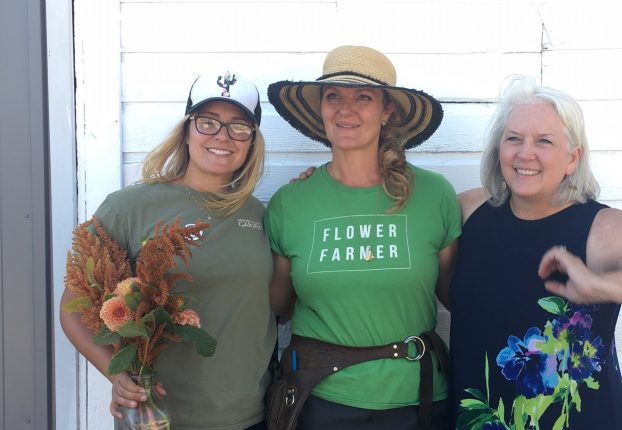
Our Slow Flowers Workshop and Tour at Red Daisy Farm capped of two wonderful days in Denver earlier this month. From left, Sarah Olson, Meg McGuire and Debra Prinzing
The following day, we had two tours on the schedule. I’ll tell you about our visit to Red Daisy Farm in Brighton, Colorado, first. Meg McGuire and Terry Bauman own Red Daisy Farm, where they grow cut beautiful flowers to sell to florists and DIY brides, operate an equally beautiful Air BnB on the farm, and open up the barn for regular sales of antiques, collectibles and Meg and her sister’s regular vintage finds.
The DBG group gathered for a farm tour with Meg, followed by a delicious lunch and a hands-on floral design workshop that I taught, using gorgeous flowers, herbs and foliage from the farm. Meg is a past guest of this podcast.
We had sold-out attendances at The Fresh Herb Co. and at Red Daisy Farm and I’m so pleased that more people in that community connected with locally-grown flowers in a significant way by meeting the people behind the flowers. That’s authentic and beats any expensive marketing campaign, folks.
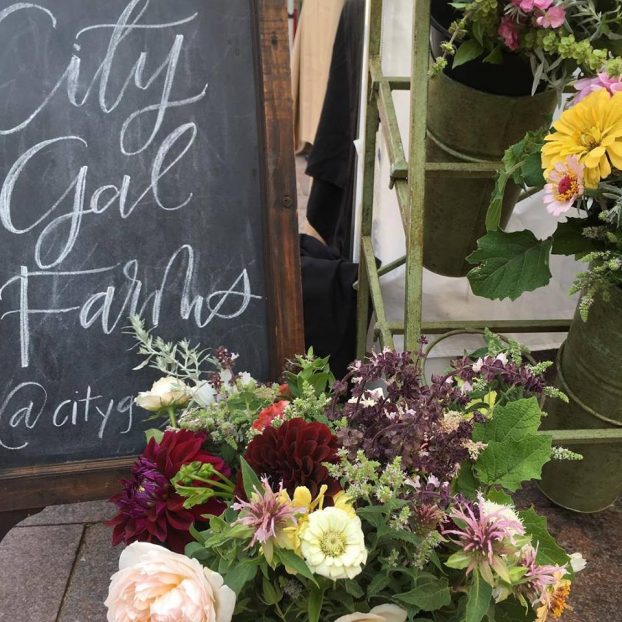 Our final tour was set for CityGal Farms, owned by Kim Burton and her husband Ken in Lakewood, Colorado, just outside Denver’s city limits. I was so excited to see Kim’s operation, because she had invited us to visit during harvest and production for CityGal’s regular bouquet-making session.
Our final tour was set for CityGal Farms, owned by Kim Burton and her husband Ken in Lakewood, Colorado, just outside Denver’s city limits. I was so excited to see Kim’s operation, because she had invited us to visit during harvest and production for CityGal’s regular bouquet-making session.
Denver Botanic Garden has been promoting this Slow Flowers programming for months, which is why we were so devastated for Kim when one week prior to the tour a summer hail storm hammered CityGal Farms.
She posted photos of the hail damage on her Facebook page and wrote this:
Late Wednesday, our farm got hit with hail, rain and wind. Most of our orders had thankfully been harvested, and while not everything was destroyed, our plants took a pretty heavy beating. Thankfully we have a good team that jumped into action, and we are babying them back to health. Getting hit with hail is never good for farmers, and we join the roster of many Colorado farmers who have been affected by hail this year; getting hit in the biggest wedding month of the year and our opportunity to turn a profit is painful. Still, we love what we do, and the little bit of beauty we bring. Thanks to our amazing crew and customers who continue to support our farm. We are humbled by your dedication.
The tour was regrettably cancelled, but the good news is that CityGal Farms is bouncing back, like so many others have done. In fact, similar wind and hailstorms have hit Red Daisy Farm twice this year — last spring and early summer, damaging their hoop houses and destroying huge swaths of flowers. And at The Fresh Herb Company a few years back, flooding and the residual mud flow from that disaster wiped out nearly a full season’s production.
There is passion and true grit behind what flower farmers do — day in and day out. And I’m so proud to be in this community where we can support one another, share ideas, dreams, resources, experiences. I am also committed to helping those in the Slow Flowers Community tell their stories.
Today, that story comes from Kim Burton of CityGal Farms. She has taken a path that will resonate with many of you. One that is a deeply personal narrative that led her from a corporate background to a life connected with the land.
I love how Gina Hemmings of Mossflower, a CityGal floral design customer and Slow Flowers member, describes the farm on her web site’s “meet the grower” page. Gina writes:
Hidden in plain sight, CityGal Farms is an urban farm and farmhouse retreat (available via Airbnb) located just 5 miles west of downtown Denver. Kim grows classic and beautiful focal flowers such as dahlias, lisianthus and garden roses utilizing organic methods. She’s also growing interesting foliage and accent flowers including bells of Ireland, raspberry and blackberry vines, scented geranium, herbs and delphinium. On summer weekends, you can find Kim at the Union Station and Pearl Street Farmers Markets in Denver.
Please enjoy my conversation with Kim Burton. Here’s how you can find and follow CityGal Farms:
This week, I’ll be in Raleigh, N.C., with the Association of Specialty Cut Flower Growers, annual symposium — where I will be presenting a preview of the 2019 Slow Flowers Floral Insights & Industry Forecast. I’m eager to connect with so many of you! And you can be sure that I’ll have my audio recorded and microphone with me to capture more interviews to bring to listeners. Stay tuned!
 We have a vital and vibrant community of flower farmers and floral designers who together define the Slow Flowers Movement. As our cause gains more supporters and more passionate participants who believe in the importance of the American cut flower industry, the momentum is contagious.
We have a vital and vibrant community of flower farmers and floral designers who together define the Slow Flowers Movement. As our cause gains more supporters and more passionate participants who believe in the importance of the American cut flower industry, the momentum is contagious.
I know you feel it, too. I value your support and invite you to show your thanks and with a donation to support my ongoing advocacy, education and outreach activities. You can find the donate button in the column to the right.
The Slow Flowers Podcast has been downloaded more than 363,000 times by listeners like you. Thank you for listening, commenting and sharing – it means so much.
Thank you to our sponsors who have supported Slow Flowers and all our programs.
Florists’ Review magazine. I’m delighted to serve as Contributing Editor for Slow Flowers Journal, found in the pages of Florists’ Review. It’s the leading trade magazine in the floral industry and the only independent periodical for the retail, wholesale and supplier market.
Arctic Alaska Peonies, a cooperative of passionate family farms in the heart of Alaska providing bigger, better peony flowers during the months of July and August. Visit them today at arcticalaskapeonies.com
Seattle Wholesale Growers Market, a farmer-owned cooperative committed to providing the very best the Pacific Northwest has to offer in cut flowers, foliage and plants. The Growers Market’s mission is to foster a vibrant marketplace that sustains local flower farms and provides top-quality products and service to the local floral industry. Find them at seattlewholesalegrowersmarket.com
Longfield Gardens provides home gardeners with high quality flower bulbs and perennials. Their online store offers plants for every region and every season, from tulips and daffodils to dahlias, caladiums and amaryllis. Visit them at longfield-gardens.com.
Syndicate Sales, an American manufacturer of vases and accessories for the professional florist. Look for the American Flag Icon to find Syndicate’s USA-made products and join the Syndicate Stars loyalty program at syndicatesales.com.
Johnny’s Selected Seeds, an employee-owned company that provides our industry the best flower, herb and vegetable seeds — supplied to farms large and small and even backyard cutting gardens like mine. Check them out at johnnysseeds.com.
Association of Specialty Cut Flower Growers. Formed in 1988, ASCFG was created to educate, unite, and support commercial cut flower growers. It mission is to help growers produce high-quality floral material, and to foster and promote the local availability of that product. Learn more at ascfg.org
Mayesh Wholesale Florist. Family-owned since 1978, Mayesh is the premier wedding and event supplier in the U.S. and we’re thrilled to partner with Mayesh to promote local and domestic flowers, which they source from farms large and small around the U.S. Learn more at mayesh.com.
Certified American Grown Flowers. The Certified American-Grown program and label provide a guarantee for designers and consumers on the source of their flowers. Take pride in your flowers and buy with confidence, ask for Certified American Grown Flowers. To learn more visit americangrownflowers.org.
And the Team Flower Conference – a professional floral event where flower lovers from all over the world gather for networking, learning, and celebration. It’s a special time for the floral industry to come together and whether you’re a farmer, designer, wholesaler, or just love flowers, you’re invited to attend as Team Flowers dreams big for the industry’s future. Head to teamflower.org/slowflowers to learn more about the 2019 conference in Waco, Texas!
I’m Debra Prinzing, host and producer of the Slow Flowers Podcast.
Next week, you’re invited to join me in putting more American grown flowers on the table, one vase at a time. And If you like what you hear, please consider logging onto iTunes and posting a listener review.
The content and opinions expressed here are either mine alone or those of my guests alone, independent of any podcast sponsor or other person, company or organization.
The Slow Flowers Podcast is engineered and edited by Andrew Brenlan. Learn more about his work at soundbodymovement.com.









